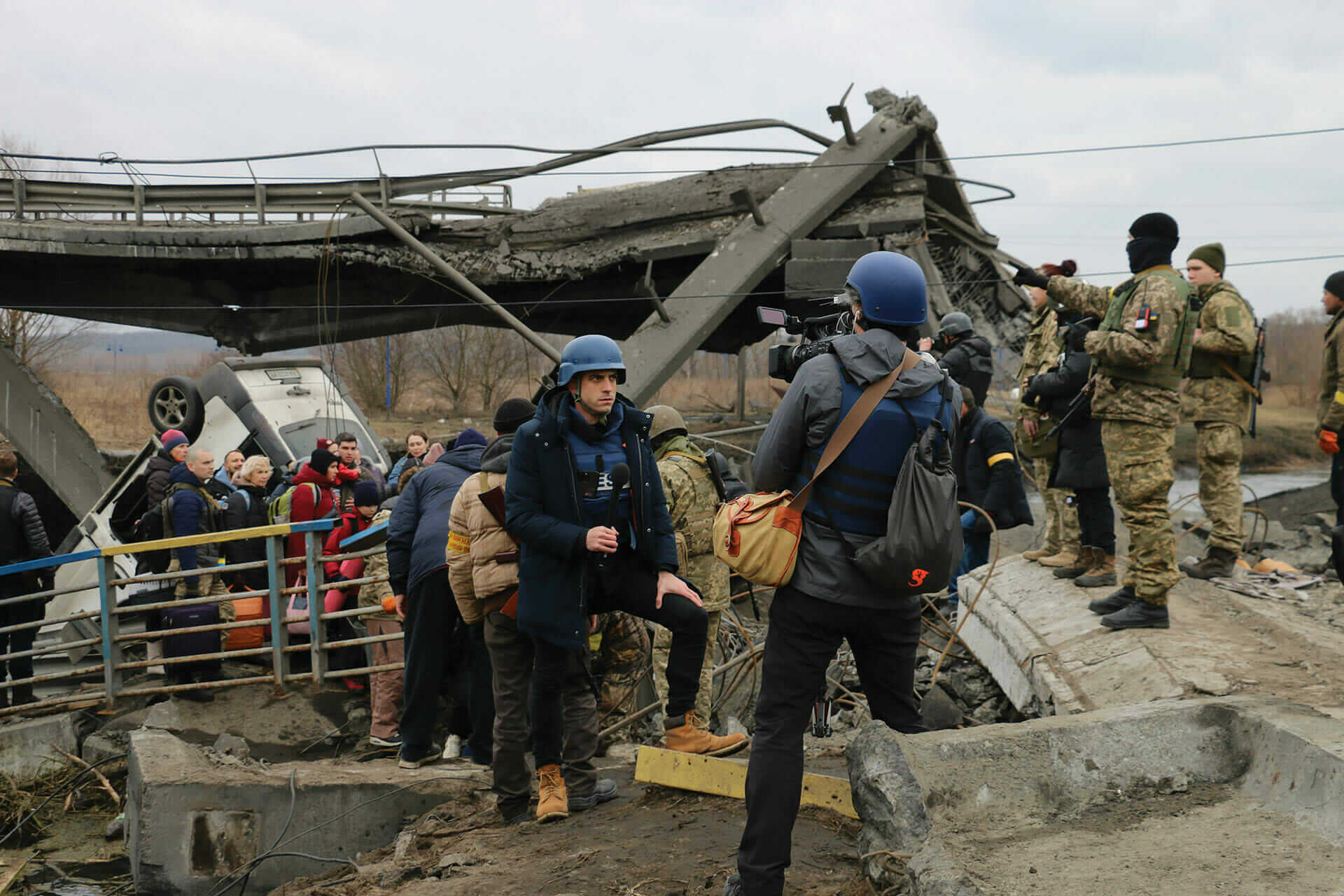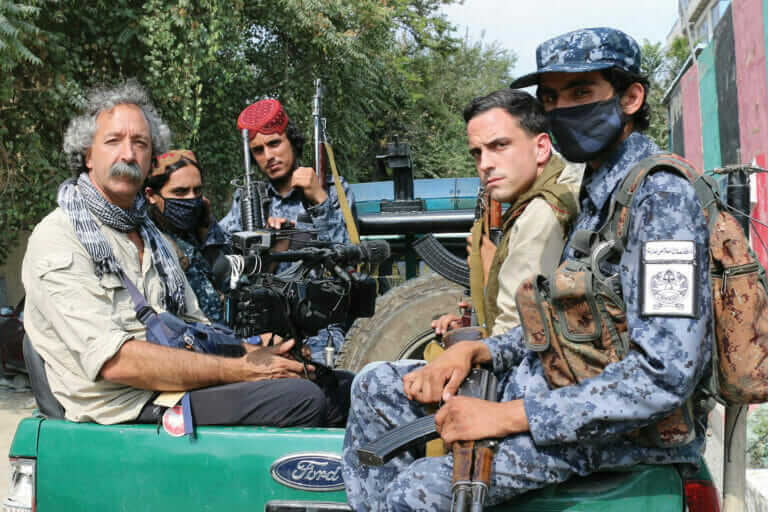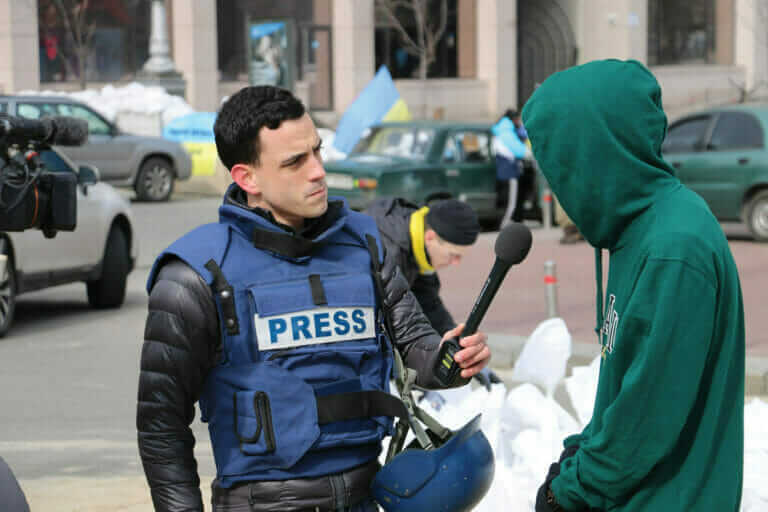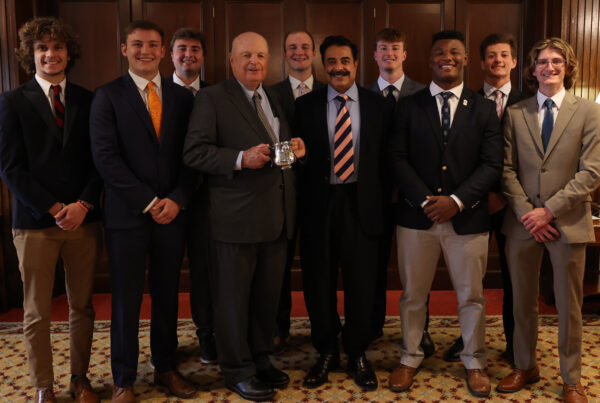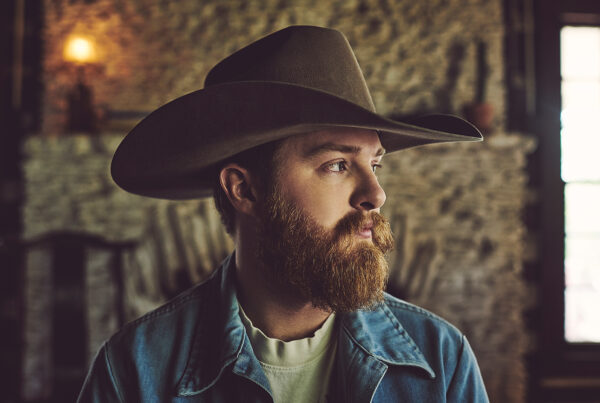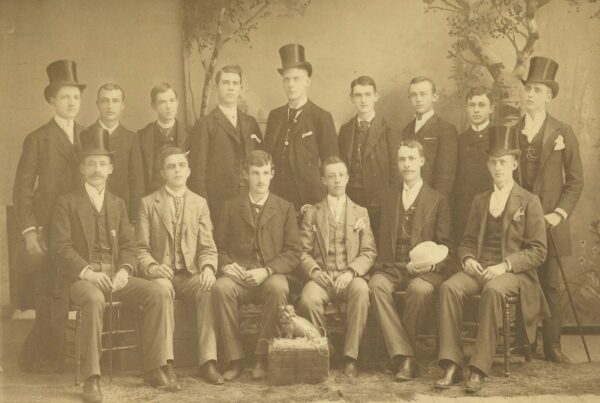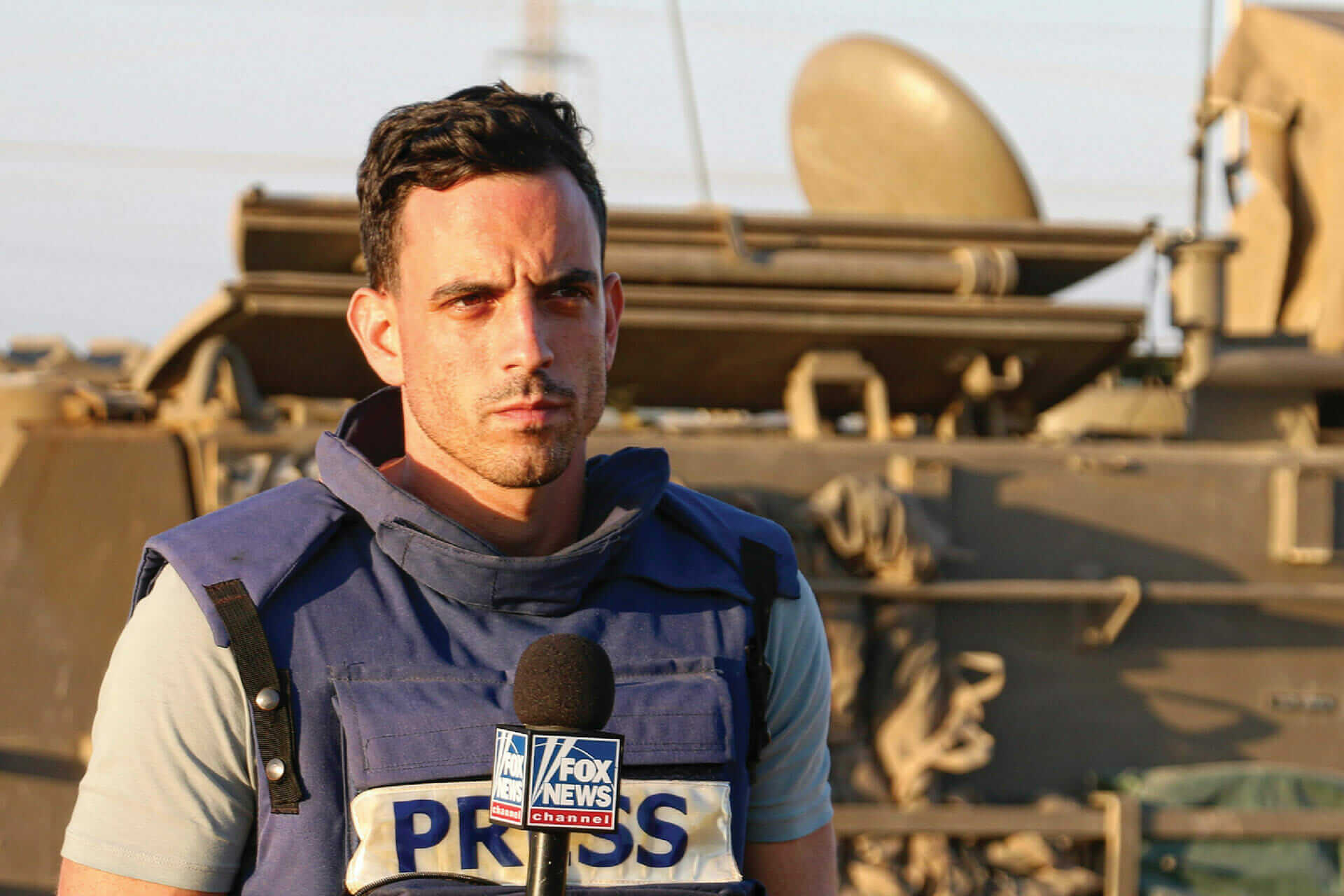
An interview with Fox News Foreign Correspondent Trey Yingst, American ’16
As Russian artillery shells began raining down on Ukraine in February, one Beta brother, Trey Yingst, American ’16, wasn’t running away from the war – he was running to it.
The Fox News foreign correspondent, frequently gracing television screens donning his press vest and blue safety helmet, has led the network’s coverage of the conflict ever since. Over the sounds of air raid sirens and distant explosions, Yingst, 28, has brought the brutal realities of war into millions of American households. This is not the young reporter’s first time in a danger zone, but rather the most recent in a long series of assignments where he confronts disaster and violence.
Born in Harrisburg, Pennsylvania, and a founding father of the Eta Pi Chapter at American University, Yingst’s journalism career launched before he had even received his diploma. As a co-founder of news media outlet News2Share in 2014, he balanced his schoolwork with on-the-ground assignments in places like Gaza, Ukraine, Rwanda, Uganda and Ferguson, Missouri.
He became a recognized name soon after graduating when he became chief White House correspondent for One America News Network in 2016. In 2018, he joined Fox News in his current role based out of Jerusalem. He was named to the Forbes “30 Under 30” media list and Adweek’s “Young Influentials” list in 2019.
As quickly as Yingst’s career has skyrocketed, so too has his reputation. He has sparred with White House press secretaries, ridden in the back of a pickup truck with the Taliban, conducted interviews with presidential advisors and broke stories that led to government action against bad actors. In short, he has won the admiration of the public and his peers in just a short few years.
Though he returned to Ukraine shortly thereafter, The Beta Theta Pi magazine secured an interview with Yingst in April when he was home in the United States for a brief respite. With support from his network and no topic off the table, he discussed his time abroad and how Beta influences his life and work.
Editorial note: This interview has been edited for length and clarity.
What was it that drew you to attend American University?
My aunt and uncle live in Washington, D.C., so I grew up attending Washington Wizards games in the district. If you want to go to school there, you normally look at Georgetown, George Washington or American. I knew the city well, wanted to work in international relations or do something that involved learning more about the world, and I was already familiar with AU’s campus because my dad is an alumnus. Everything I thought about Washington turned out to be true – it is a place to meet people from all around the world and get a taste of where things are happening. American University is where things are happening.
Did you always want to study journalism?
No. I first went to school interested in international relations. I joined the school TV station, though, and from there started a company called News2Share. Basically, we were a media aggregator and a “stringer service,” traveling around the world covering conflict, current events and foreign policy. So, I got into broadcast by early sophomore year and made it my major. I ended up really focusing most of my time on journalism while at school.
When did Beta arrive on American’s campus and what drew you to becoming a member?
I’m a nerd when it comes to school. I really enjoy learning and already had a great group of friends my freshman year, so I just wasn’t interested in Greek life at first.
A good friend of mine was involved in bringing Beta to AU my sophomore year. I was always resistant to fraternities because I didn’t have the time or desire to go through any sort of prolonged new member process. With Beta, there was certainly still a process – learning about the Fraternity and those types of things – but it still allowed me to focus on my studies while becoming a part of something that was new.
How did you ultimately decide you wanted Beta to be part of your college experience?
I was resistant to joining Greek life in general because of the stereotypes. However, my friend gave me a pamphlet about Beta, and although I was still hesitant at first, the core values of the Fraternity were things that I was personally interested in not only practicing in my own life but also learning more about.
Specifically, intellectual growth. As I said, I’m very into studying and learning about what’s going on in the world, which is an important part of what I do in my job today. Also, trust is very important to me. It was ingrained in me by my parents growing up and it’s an integral part of my career. I want to trust the people that I’m around.
My friend said, “Why don’t you at least meet the guys who came to the university to start Beta, and if you think it’s something you’d be interested in, you can get involved?” And from there, I got involved.
As an undergraduate, you were extremely busy diving head-first into your journalistic endeavors. How did you make the most of your Beta membership given your hectic schedule?
I would say I probably still had a very traditional experience. I would attend chapter meetings on the weekends whenever I was in town, and at one point I even ended up living with a few of my brothers.
One thing that really stood out for me was our experience with fundraising. It was another one of the Fraternity’s core values – this idea of mutual assistance. I thought it was cool that this group of guys that I became friends and brothers with wanted to help out in the community.
My mother has kidney transplants, so my entire life she’s had health issues. There is a charity called Nora’s Home in Houston that serves the families of people with such conditions, and it’s a place we stayed at sometimes when my mother received medical treatment.
Something I’ll never forget is that the Fraternity made that their charity. When we would have fundraising events like a flag football tournament, for example, the money we raised would go to Nora’s Home. That meant a lot to me. I thought it was very symbolic of these guys I remain brothers with today that they identified something that was important to me and then wanted to make sure our philanthropy efforts went to this organization.
How has your time as a Beta helped you as a reporter today?
In Beta, I learned a lot about problem solving, dealing with differing opinions and how to communicate with and understand diverse groups of people. Those are all things that are applicable to what I do today.
It’s not a given that you learn these things in a university. There’s no class on how to become a good leader or act as a good representative for your organization. Those were things I learned in Beta.
You mentioned your work as a founder of News2Share, but right after graduating college you became a chief White House correspondent. Now you’re with Fox based out of Jerusalem. What from your experience has best prepared you for your current role?
Probably my work at News2Share, which had me traveling around the world to places like Ukraine and Gaza as far back as 2014. It’s interesting looking back because those are a lot of the places I still cover today at Fox.
What’s changed for me is the amount of resources I have to tell those stories. And certainly the audience. I mean, Fox is number one, and you see it not only in the numbers but I think also in the quality of our reporting. I’m really proud to be part of that team.
Each and every day when I’m in the field I see the focus this company has on news and getting the stories out there, not only from Ukraine but from Afghanistan, Iraq, Lebanon, Gaza, all these places I’ve been sent on assignment. It’s a reminder of how lucky I am to have this opportunity.
You’ve ridden in truck beds with the Taliban and reported from some of the most dangerous places on earth. Do you ever get scared?
Um, no. People ask me this question a lot and I’m rarely scared, but I’m always prepared. I think that’s critical going into global war zones. You have to constantly be preparing and up-to-date about what’s happening.
I find that fear is not a very useful emotion in war. I often see people who are afraid, and they tend to make rash decisions. That’s the last thing my crew and I need when facing dangerous situation. It’s important for me to be levelheaded and make decisions to the best of my ability based on the information we have.
Those decisions often are not editorial ones. They’re not, “Let’s get this interview to air,” but rather, “OK, let’s move here because we could take incoming fire.” They must be made very clearly and efficiently. You’ll see sometimes I must make them live on air.
There were several times last year, before the war between Israel and Gaza, for example, where there were these massive flashes in Jerusalem. On air I might have to say, “Alright guys, listen to me, we need to move.” I have to be calculated and I have to be precise.
You’re Beta’s eyes on the ground during this current conflict in Ukraine. What are you seeing there that we can’t fully grasp from the comforts of our own homes?
I think it’s the decisions that people have to make, which are often misunderstood simply because they are so massive on an individual scale.
We talk about numbers like 4 million Ukrainians who have fled the country since the invasion began, but that’s 4 million individuals who had to make probably the most difficult decision of their lives to either leave their entire home and sometimes family behind to get to safety or to stay and risk being killed. I think often we don’t grasp how hard that individual’s choice must be.
That’s partly why, in our reporting from Ukraine, we try to find individuals who represent a larger problem or a larger issue. I can tell you 4 million people fled Ukraine because of the Russian invasion, but how do I make you care about that number? How do I make you understand what that really means? Part of my job as a journalist on the ground is to talk to people and make sure our viewers can relate to them and really understand just how dire their situations really are.
Is there a particular Ukrainian's story that has stuck with you?
There was one woman we met on a bridge as she was fleeing the suburbs of Kiev where Russian forces had committed a number of real atrocities against the civilian population. Her name is Evgenia Antonenko and she was escaping the town of Irpin, which is right next to Bucha outside of Kiev. The way that she described her journey and her situation in life will stick with me forever. She said, “It’s like your life is broken forever and you have no hope.”
She was with her young daughter, and she told me how she shielded the eyes of this girl from bodies in the streets of their hometown. When you look into the eyes of a mother who has gone through so much, you understand really just how horrible an experience like that can be for a human. She wants to do everything she can to protect her daughter, but it’s very difficult when Russians are targeting these civilian areas and people are trying to simply get to safety.
As we were talking to her, there were incoming Russian rounds on either side of this bridge. You could tell she was trying to stay strong for her daughter, but if you looked into her eyes you realized she was terrified and just trying to do everything she could to protect her little girl.
It must take a toll on you when you’re constantly surrounded by devastation, chaos, violence and sadness. How do you stay centered?
We’re often there for the worst day of someone’s life, and it absolutely affects you. You wouldn’t be human if it didn’t.
It can be a little challenging to reintegrate into a normal life when I come back from these places, but I have a routine where I meditate, go to the gym, run and generally make time to prioritize my own physical and mental health.
Do you see yourself ever taking a calmer, more predictable beat?
I think my parents would be happy if I did that, but I love this job. Really. It’s part of who I am and it consumes me each and every day. And I love the place that I work. So, right now I’m happy living in the moment and I feel very present. That dream I had when I was a student at American University, when I joined Beta, is what I’m currently living.
As you look back on your time at AU, in Beta and as a reporter, what’s your advice to brothers out there?
First, nothing replaces hard work. If you have a goal in mind, work hard each day to get there. Stay focused on the mission and on your goal.
Second, you’re only as good as the people around you. It’s critical to surround yourself with people who lift you up, want you to succeed and would do anything for you.
And third, on the road to success you are going to fail more than you succeed. Don’t let that discourage you. Keep moving forward. Learning to fail well is a very important thing.

